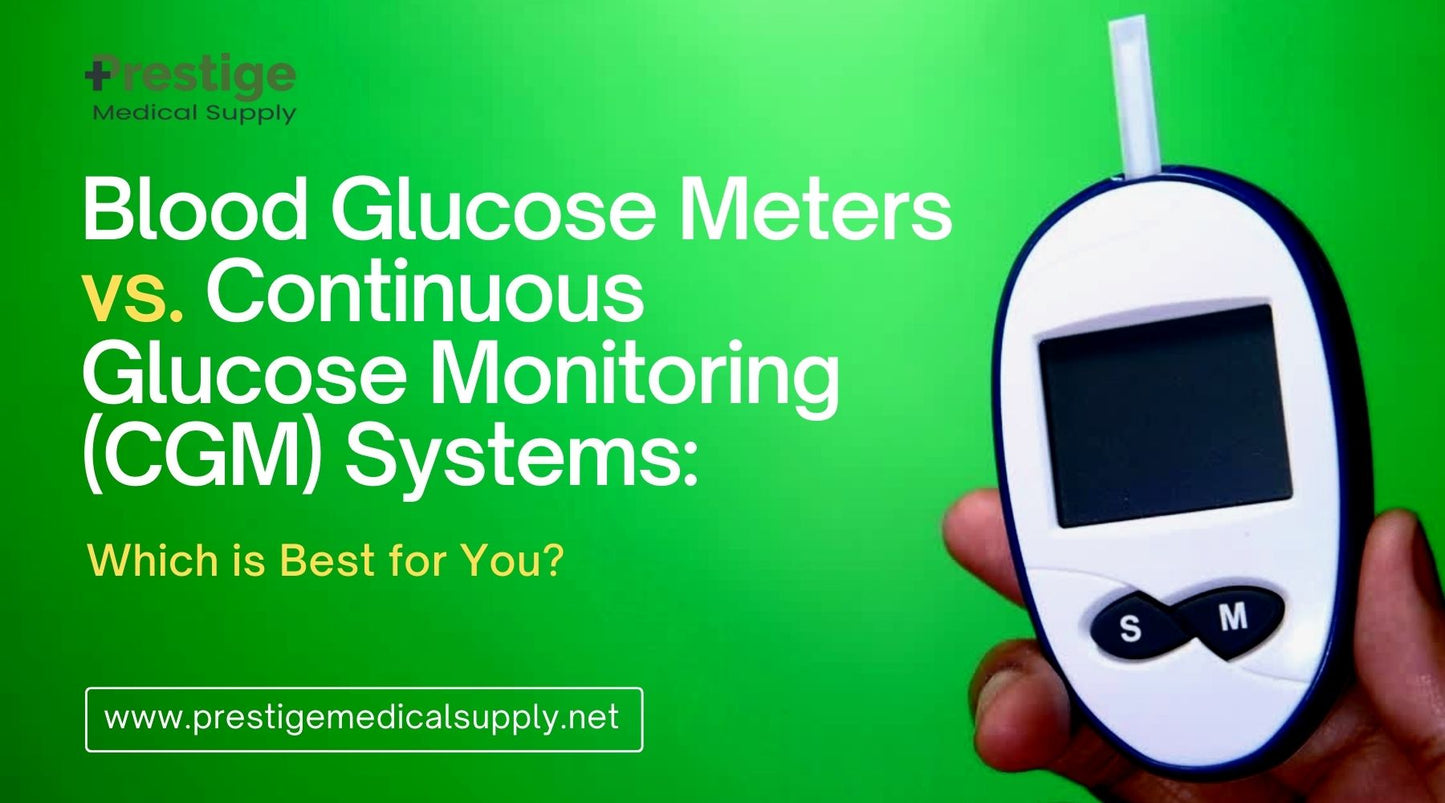
What You Need To Know
When it comes to managing diabetes, monitoring blood glucose levels is crucial. Blood glucose meters and continuous glucose monitoring (CGM) systems are two commonly used tools that help individuals with diabetes track their glucose levels. In this comprehensive analysis, I will delve into the differences between these two technologies, their pros and cons, and ultimately help you determine which one may be best suited for your needs. Additionally, I will mention Freestyle Libre 14 glucose sensor kit and Dexcom G6 sensor products, two highly recommended CGMs, throughout the article. If you're interested in obtaining Glucose Monitoring System supplies, I recommend visiting prestigemedicalsupply.net.Understanding Blood Glucose Meters:
Blood glucose meters are portable devices that allow individuals to measure their blood glucose levels at a specific moment in time. These meters typically require a small blood sample obtained by pricking the finger with a lancet. The sample is then placed on a test strip, which is inserted into the meter. Within seconds, the meter displays the current blood glucose reading.Pros of Blood Glucose Meters:
Accuracy: Blood glucose meters provide precise and immediate readings, allowing for quick adjustments in insulin doses or other diabetes management strategies.
Affordability: Compared to blood glucose monitoring system supplies, blood glucose meters are generally more affordable, making them accessible to a wider range of individuals.
Ease of Use: Blood glucose meters are user-friendly and require minimal setup. They are compact and can be carried anywhere, allowing for convenient monitoring on the go.
Cons of Blood Glucose Meters:
Lack of Continuous Monitoring: Blood glucose meters only provide a snapshot of blood glucose levels at the time of testing. They do not provide continuous data, which can be limiting in understanding glucose trends and patterns throughout the day.
Pricking Finger: The process of pricking the finger multiple times a day can be uncomfortable and inconvenient for some individuals, especially those with sensitive skin.
Potential for User Error: Blood glucose meters rely on the user's technique and accuracy in obtaining a blood sample, which can sometimes lead to inconsistent or inaccurate readings.
Understanding Continuous Glucose Monitoring (CGM) Systems:
CGM systems, on the other hand, provide continuous, real-time glucose monitoring by measuring interstitial fluid glucose levels. These systems consist of a small sensor inserted under the skin, which wirelessly transmits data to a receiver or smartphone app. Freestyle Libre 14 sensor kit and Dexcom G6 sensor are two highly recommended CGM brands that offer advanced features and accuracy. If you're considering CGM systems, I encourage you to explore the options available at prestigemedicalsupply.net.
Pros of CGM Systems:
Continuous Monitoring: CGM systems offer a constant stream of glucose data, providing valuable insights into how glucose levels fluctuate throughout the day, including overnight trends.
Alerts and Alarms: CGM systems can be programmed to provide alerts and alarms when glucose levels go too high or too low, enhancing safety and enabling proactive management. Brands like Freestyle Libre and Dexcom have advanced alarm systems to alert users promptly.
Trend Analysis: CGM systems generate reports and graphs that illustrate glucose trends, patterns, and variability, empowering individuals to make informed decisions regarding insulin dosing and lifestyle adjustments. Freestyle Libre and Dexcom provide user-friendly apps and software for comprehensive data analysis.
Cons of CGM Systems:
Cost: CGM systems tend to be more expensive than blood glucose meters. The initial investment includes the sensor, receiver, and other necessary components, as well as ongoing costs for sensor replacements. However, the benefits and advanced features when using supplies like Freestyle Libre 14 sensor kit and Dexcom G6 1 pack sensor often outweigh the cost for many individuals.
Calibration and Maintenance: CGM systems require regular calibration with blood glucose meter readings to ensure accuracy. Additionally, sensors need to be replaced every few days, adding to the overall maintenance effort. Freestyle Libre 14 sensor kit and Dexcom G6 sensors provides clear instructions and support for calibration and maintenance processes.
Learning Curve: CGM systems may have a steeper learning curve compared to blood glucose meters. Understanding and interpreting the continuous glucose data may require some time and effort to fully grasp. However, brands like Freestyle Libre and Dexcom offer user-friendly interfaces and resources to facilitate the learning process.
Choosing the Right Option for You:
Deciding between a blood glucose meter and a CGM system depends on various factors, including individual preferences, lifestyle, and diabetes management goals. If you prefer or require frequent glucose monitoring and desire continuous data and advanced features, glucose monitor supplies such as Freestyle Libre and Dexcom may be the best choice for you. Prestigemedicalsupply.net offers a wide selection of CGMs, including Freestyle Libre and Dexcom, to meet your needs.
Conclusion:
In conclusion, both blood glucose meters and CGM systems have their own strengths and weaknesses. Blood glucose meters provide immediate and accurate readings, affordability, and ease of use. On the other hand, CGM systems, including highly recommended brands like Freestyle Libre and Dexcom, offer continuous monitoring, trend analysis, and safety alerts. Choosing between the two depends on individual needs, preferences, and the level of diabetes management required. If you're interested in obtaining CGMs, I recommend visiting prestigemedicalsupply.net to explore the options available to you.
Remember, managing diabetes is a dynamic process, and technology continues to advance. Stay informed about the latest advancements in glucose monitoring and consider reevaluating your options periodically to ensure you are using the most suitable tools for your diabetes management needs.
